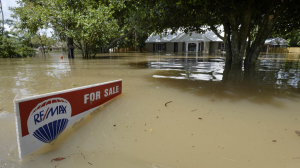New Jersey Future Blog
Planning for Sea-Level Rise VII: Disclosure
February 21st, 2017 by New Jersey Future staff
This series of articles was written by New Jersey Future intern Connor Montferrat.
 This is the seventh of a series of posts that will examine strategies being used in states throughout the country to reshape development patterns in response to risks posed by rising sea levels and a changing climate. The objective of the series is to present practical and tested adaptation and mitigation approaches that New Jersey communities might use to help respond to the growing threat presented by our subsiding and eroding coastlines, increasingly frequent and severe storms, and mounting flood risks.
This is the seventh of a series of posts that will examine strategies being used in states throughout the country to reshape development patterns in response to risks posed by rising sea levels and a changing climate. The objective of the series is to present practical and tested adaptation and mitigation approaches that New Jersey communities might use to help respond to the growing threat presented by our subsiding and eroding coastlines, increasingly frequent and severe storms, and mounting flood risks.
This article considers requirements for disclosure of a property’s vulnerability to flooding.
Disclosure requirements offer notice of flood risks, flood zone boundaries, and flood insurance requirements in all agreements of sale.
Examples in Current Use
- California’s Natural Hazard Disclosure Law requires sellers to disclose if their residential property is in a natural hazard area. Sellers must disclose if their property is in a special flood hazard area, as designated by flood insurance rate maps, or if the property may flood in the event of a dam failure as determined by the state Office of Emergency Services. There is high compliance and the law has ultimately influenced property values in hazard-prone areas. To cite one example, after the law was enacted, a floodplain home sold for 4.1 percent ($8,000) less than a comparable non-floodplain home.
- New York requires all sellers of residential real property to fill out a Property Condition Disclosure Statement form and deliver it to the buyer or buyer’s agent prior to the sale. The form instructs sellers to disclose, whether (to their knowledge) the property is located in a designated floodplain or wetland.
- South Carolina state law requires sellers to disclose erosion and coastal risks based on state-adopted setbacks.
Without a formal method to ensure proper notification, people considering the purchase of properties in coastal areas are likely to be unaware whether the property is located in an area of potential risk. Requiring disclosure of such information prior to sale of a property will offer a necessary degree of consumer protection and should be common real estate practice.
















